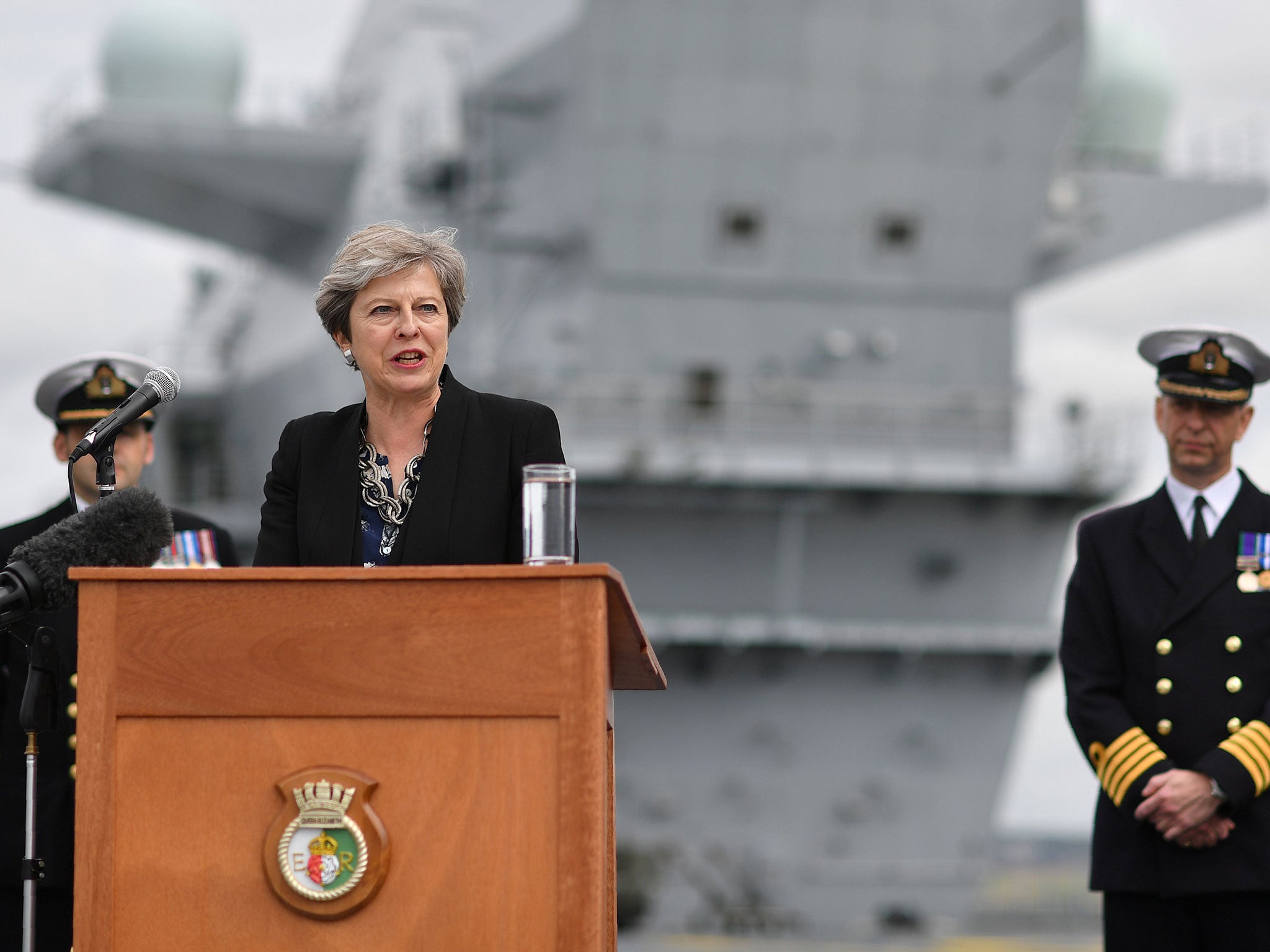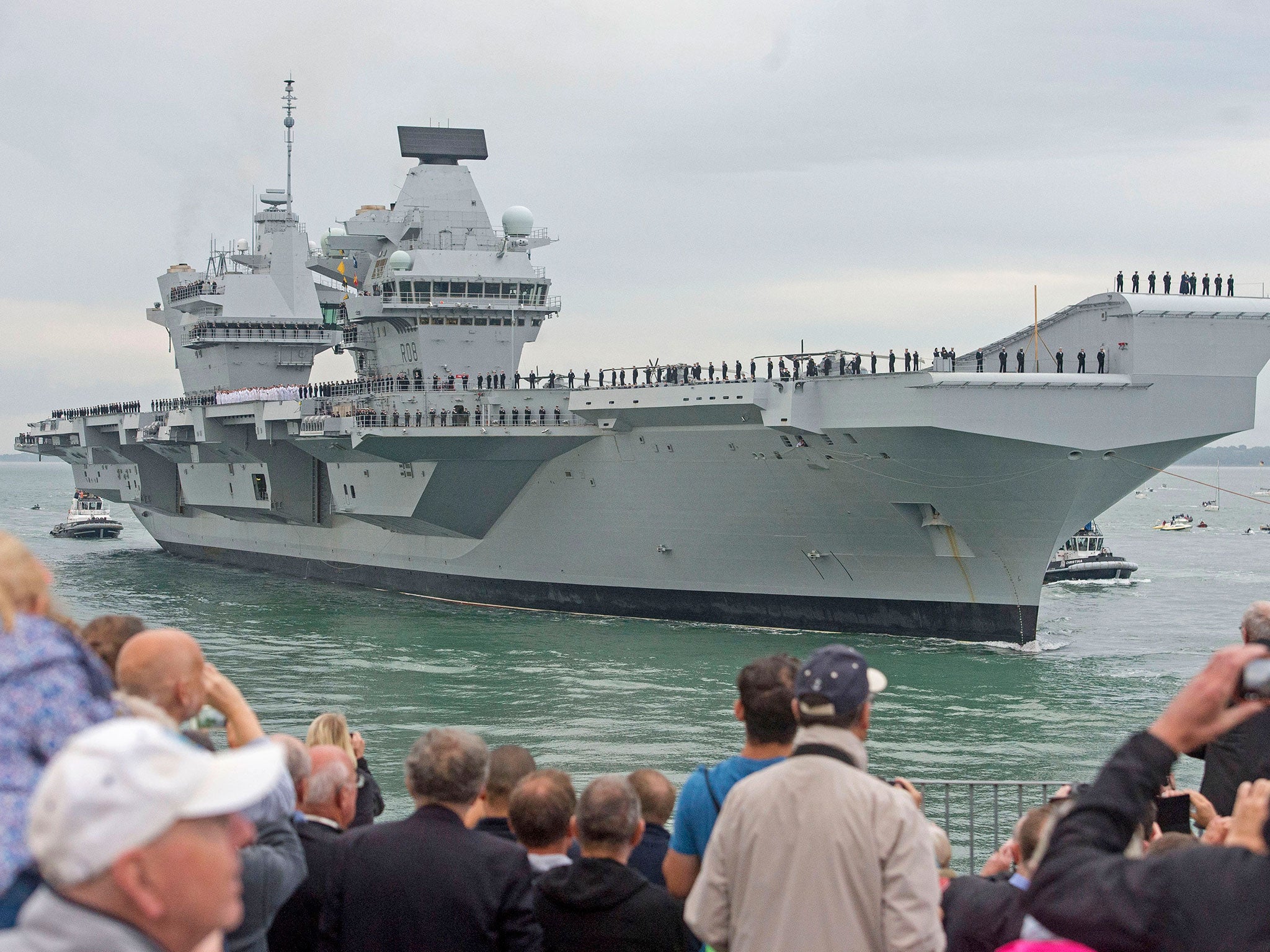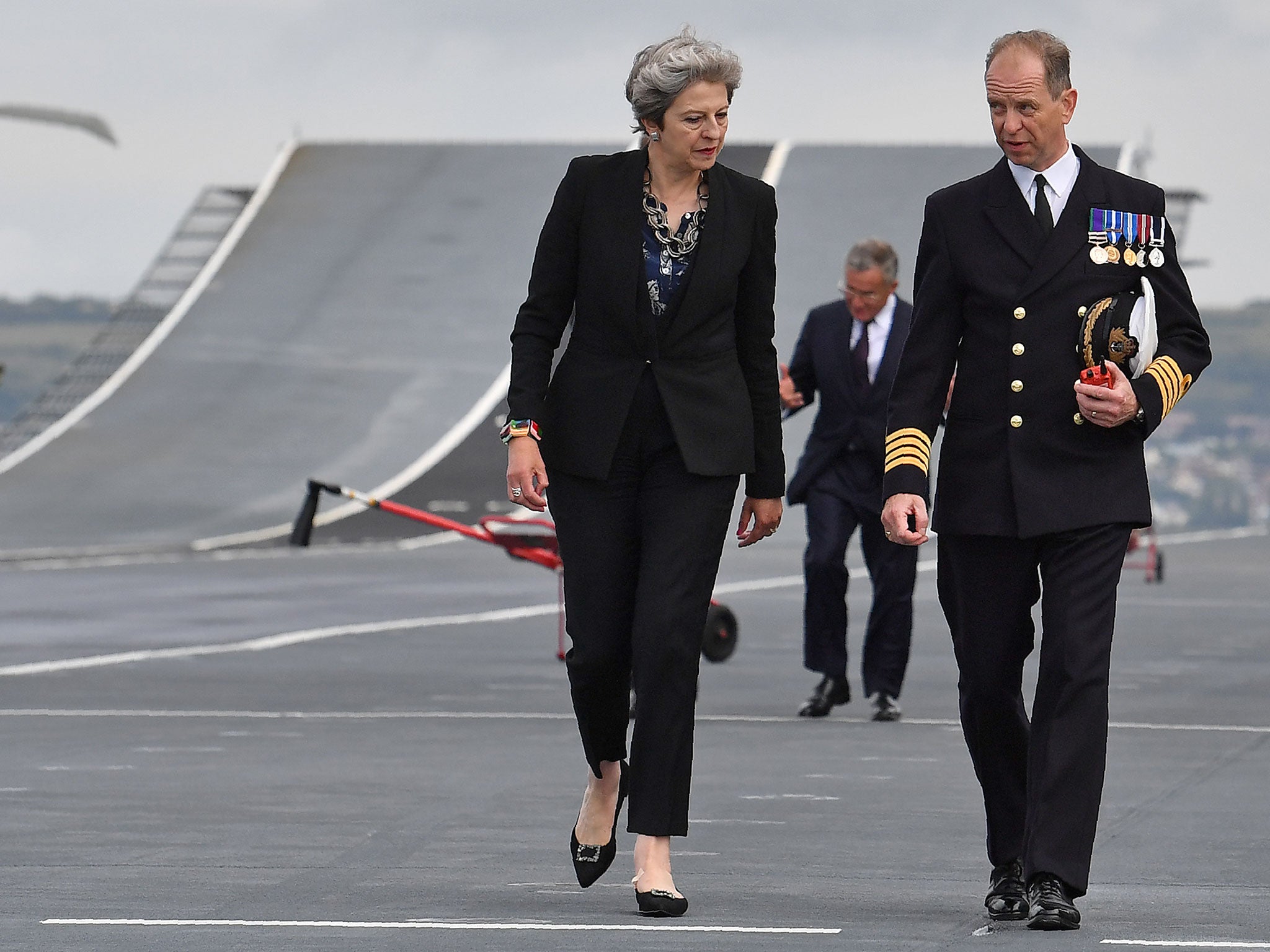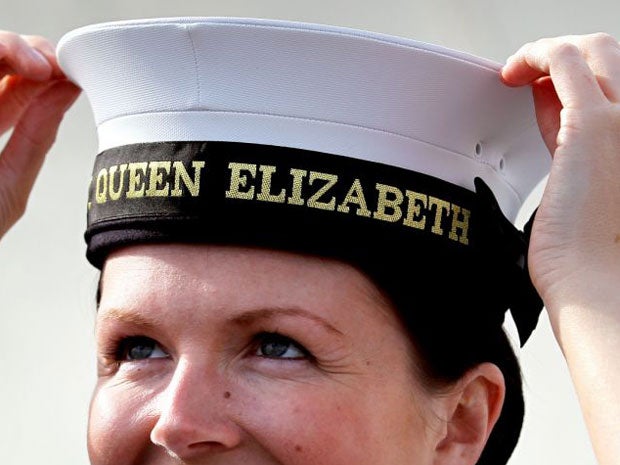HMS Queen Elizabeth: UK's new £3bn aircraft carrier dismissed as 'massive distraction’
Former military commanders warn ship is vulnerable to attack as modern warfare evolves
Claims that the UK’s new £3bn aircraft carrier represents a “new era” of maritime power for post-Brexit Britain have been greeted with scepticism by former military officers.
Theresa May hailed the HMS Queen Elizabeth as a “highly versatile and potent asset” to combat modern threats, but critics have panned it as a “totemic symbol” that could swiftly be left behind by emerging technology.
Tens of thousands of people gathered to watch the largest warship ever built for Britain arrive in Portsmouth with its company standing to attention on board.
It was followed by a flotilla of ships as helicopters and jets flew ahead and a band of the Royal Marines played to entertain the crowds.
Speaking on board, the Prime Minister said: “Britain can be proud of this ship and what it represents.
"It sends a clear signal that as Britain forges a new, positive, confident role on the world stage in the years ahead we are determined to remain a fully engaged global power, working closely with our friends and allies…whether the task be high intensity war-fighting, targeted action to fight terrorism, or humanitarian relief to save lives overseas, these ships will transform the UK's ability to project power around the world.”

The head of the Royal Navy hailed the HMS Queen Elizabeth as the “embodiment of Britain in steel and spirit” that will act as a post-Brexit ambassador to the globe.
"It's a triumph of national strategic ambition and a lesson for the future,” said First Sea Lord Admiral Sir Philip Jones.
"As we prepare to leave the European Union, I have no doubt that the Queen Elizabeth-class will help take our nation's message of partnership and prosperity to the rising economies of the world, aided by the very best ambassadors we could wish for: the men and women of the armed forces.
"HMS Queen Elizabeth is the nation's future flagship; the embodiment of Britain in steel and spirit.
"In the years and decades to come, she and her sister ship will demonstrate the kind of nation we are - not a diminished nation, withdrawing from the world, but a confident, outward-looking and ambitious nation, with a Royal Navy to match.”
Sir Philip conceded that the project to build the aircraft carrier and the HMS Prince of Wales, which is still under construction, has “not always been an easy path” after a series of delays and U-turns in its 20-year development.
The 919ft, 65-000 tonne HMS Queen Elizabeth has been undergoing training and tests at sea after setting out from Scotland's Rosyth dockyard in June but no date has been set for operations to start, with trial flights of its 14 jets not due to begin until next year.
Critics have accused the Government of prioritising the aircraft carriers over conventional forces while restricting the UK’s defence budget, plunging billions into two high-profile assets amid concern over expected cuts to Army troops and the Royal Marines.

Dr Peter Roberts, a former warfare officer in the Royal Navy, said the HMS Queen Elizabeth was a “significant moment for engineering achievement – but that’s about as far as we can go”.
“It’s clear that decision to pursue two carriers at the expense of everything else in defence has weakened the defence posture of the UK as a whole,” he told The Independent.
“The idea that HMS Queen Elizabeth represents national ambition is false, but it might represent a political ambition for a totemic symbol.
“It’s useful for the Government during a massive budget struggle with the military.
“There will be huge decisions coming up that the Government wishes to keep quiet following the strategic defence review and this will prove a massive distraction.”
Dr Roberts is director of military sciences at the Royal United Services Institute (RUSI), which recently published a report warning that aircraft carriers were increasingly vulnerable to cheap missile attacks from potential adversaries like Russia, China and North Korea.
The Russian defence ministry has described the HMS Queen Elizabeth as “merely a large convenient naval target” and issued a threat to the Royal Navy warning it “not to show off the ‘beauty’ of its aircraft carrier” too close to Moscow’s assets.
When in operation, it will be protected by a carrier strike group including F-35 Lightning II stealth jets, Crowsnest helicopters, destroyers, frigates and a submarine – assets critics say could be put to better use elsewhere.
“Ships can only be in one place at one time,” said Dr Roberts, citing the Gulf and South China Sea as other key areas operations.

“They have stripped out the rest of defence in order to get these two new behemoths.”
Professor John Louth, who served as an RAF officer for 16 years and has audited British defence systems, said the HMS Queen Elizabeth was a “powerful symbol and substantial piece of strategic hardware” – but also a significant target.
“Fielding these fantastic assets is something we want to do but we also have to give a mind about how we’re going to protect them,” he told The Independent.
“The balance between offensive and defensive assets needs to be very carefully considered.”
Prof Louth, who is the director for defence, industries and society at RUSI, said more and more potential adversaries are gaining access to precision guided missiles and drones as technology advances and costs fall.
He added that the idea of strike operations from aircraft carriers dated back to the Second World War, with the HMS Queen Elizabeth first conceived in 1998, but the nature of warfare has changed dramatically.
Isis is among the groups adapting and manufacturing its own unmanned aerial weapons, while an amateur photographer managed to land a £300 drone on the deck of the HMS Queen Elizabeth unchallenged while it was moored in Scotland last month.
Dr Roberts cautioned that the “democratisation of technology” meant the threat against high-tech British military assets was continually rising from nations and non-state actors, whether through conventional attacks or cyber warfare.
“The Navy still seems to think you can send squadrons of fast jets off a carrier, bomb some far part of the world and that’s the end of the matter…but we have a very different environment now,” he added.
“They are blinded by history and they’re not looking to the future.
“Certainly there are lessons to be learned but there is a failure to understand the current character of conflict and that’s a disservice to the taxpayer.”
The HMS Queen Elizabeth has run far over its original “unrealistic” budget and will incur substantial operating costs including a monthly food bill of £110,000 for the 700-strong company and 300 contractors and other personnel on board.
The UK has committed to spending at least 2 per cent of GDP on defence, as required by Nato, meaning it has the fifth-largest military budget in the world. But ongoing government “efficiencies” have prompted fears of substantial cuts to the number of Army troops and Royal Marines.
Dr Roberts, a former national representative for the Royal Navy who chaired Nato working groups and served around the world, raised concern that the Government was “ignoring the scope of the threat” to the UK.
“We have a resurgent Russia, we have a challenge to UK interests and the rule of law in the South China Sea, we have obligations we choose not to look at in Ukraine and Korea, as well as historic obligations to assist former colonies and Commonwealth countries with humanitarian aid,” he added.
“An aircraft carrier has never solved a crisis on its own.”
Sir Michael Fallon, the Defence Secretary, said the "mighty" new warship would serve as "Britain’s statement to the world: a demonstration of British military power and our commitment to a bigger global role".

“The thousands of people across the UK who have played a part in building her and her sister ship, HMS Prince of Wales, should be immensely proud," he added.
"She has made good progress in sea trials and will now embark on the next phase of preparations that will see the return of Britain‘s carrier strike ability.
“When she enters service she will help keep Britain safe at a time of increased threats.”
Update:
A spokesperson for the Ministry of Defence said threats to the HMS Queen Elizabeth including that from precision missiles were kept under constant review and the ship is "well protected" thanks to defensive systems as part of a £178bn equipment plan.
"The carriers will operate as part of a Maritime Task Group, which will be tailored to meet the required task," he added. "Carrier strike is a strategic capability that will give commanders more options, not take them away."
The MoD said the carrier was designed with the ability to be upgraded in coming decades and would be used in battles against non-state actors, potentially as part of the US-led coalition against Isis.
“The QEC Class Carriers represent the biggest increase in capability in a generation,” the spokesperson added.
“The carriers represent tremendous value for money given the unprecedented level of flexibility that they will offer the Royal Navy and the UK for many decades.
"The QEC carriers and F-35 Lightning aircraft are an investment in British security, prosperity and our place in the world.
“The carriers were commissioned long before the EU referendum, they represent Britain’s commitment to global and national security."
Join our commenting forum
Join thought-provoking conversations, follow other Independent readers and see their replies
Comments